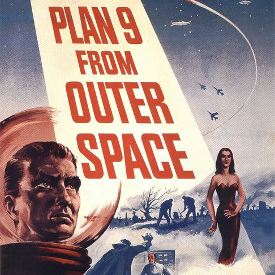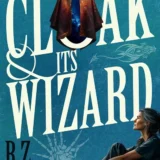
OBIR: Occasional Biased and Ignorant Reviews reflecting this reader’s opinion.

BENNY THE ANTICHRIST and other stories – by Scott Ellis
Publisher: Fossil Cove Press, Winnipeg, Manitoba, Canada, 2022
Cover Art – by Dawn Dominique
NOTE: All stories in this collection are by Scott Ellis.
FICTION:
Benny the Antichrist
Premise:
What do you do when you’re behind payments to a gangster so powerful the Crab Nebula pays it protection money?
Review:
This is a story so outrageous and over the top it’s one you read grinning from ear to ear and chuckling like a fool. Not for a moment is any of it credible. Who cares? It’s entertaining as hell.
Frank is a private facilitator so private he doesn’t have any customers. Benny is a giant alien so evil it makes Jabba the Hut seem like a kindergarten teacher. Frank owes Benny money. You’d think, Benny being so busy the past few centuries arranging disasters and catastrophes, that it’d ignore petty details like Frank, but no, Benny has a holistic grasp on everything and everybody to match its universe-sized avarice. If Al Capone were a god, that’s Benny. Come to think of it, Benny IS the Antichrist, just not exactly as anticipated.
Essentially, this is a spoof of innumerable detective fiction and science fiction cliches. Difficult to pull off unless you go full out. Scott takes the Hunter S. Thompson approach, which is to exaggerate every exaggeration to the point where the reader can’t help being amused. And yet… and yet… there’s a subliminal subtext hinting Benny is in fact no worse than your average politician, or person for that matter. A little Antichrist in us all, so to speak. Disturbing thought.
Nah. I’m kidding. Rollicking good fun is what this story is. I enjoyed it.
Brownout
Premise:
If the world is a flawless combination of life and virtual life, what happens when the power grid feeding it splutters?
Review:
A short-short. Difficult to comment without giving too much away. Let me just ask you, what’s it like waking up from a dream? Does it depend on the nature of the dream? Or on the nature of what you wake up to?
The Reason of Sleep
Premise:
Callie is reasonably happy. She and her husband Gareth make a good living as virtual reality brokers. Soon they’ll have enough money to move to the asteroid belt. But it seems her sister Sonya has joined a cult which condemns real life as a false reality. Suddenly Callie’s future is none too secure.
Review:
Everyone experiences shocks in life which call for a paradigm shift, a new understanding of one’s reality. But what if all understanding is a mere facet in an ever-shifting kaleidoscope of alternative realities which defy comprehension? Makes it difficult to plan.
But beyond the philosophical, this story takes a hard look at the nature of exploitation and the value of victimization. The hard lesson offered is that, no matter how sophisticated and complicated technology becomes, someone manipulative will always be in charge, such that the best you can hope for is to be a useful cog in the machine. Once you rebel, you are of no use to anyone, least of all to yourself.
Unless you can step outside yourself and accomplish the unexpected. Unfortunately, this kind of solution is near impossible to determine. All Callie knows is that she is increasingly in desperate need of such.
In its criticism of society and its exploration of the inner self this story very much reminds me of the best writings of Philip K. Dick. He’s my favourite SF writer, so you can take for granted I’m very much taken by this story. It’s long and dream-like and contains a lot to unpack. That’s why I like it.
Job Interview
Premise:
The game of Tetris as a metaphor for clawing one’s way up the management hierarchy of a company.
Review:
I worked for a number of corporations and Federal Government departments in my lifetime. I was never part of management but maintained a morbid interest in their shenanigans so I’d know which way to jump when the time came. Wasn’t always successful. But I do have a bit of understanding how corporate management actually functions. The metaphor is dead on.
Basically, the nature of Tetris, or what you have to accomplish to keep playing, precisely applies to your quest to crush and betray your fellow managers in order to rise above them. This is another short-short, but contains a wealth of hilarious rules that would make Machiavelli grin. Quite amusing. Yet valuable. A primer for life, really. Very useful.
Fae-Dar
Premise:
Turns out Goblins, Elves, Trolls and the like have been living among us disguised as fellow humans. Then some fool invented a camera that shows them as they really are.
Review:
Going into a bar you’ve never patronized before is always a bit risky, especially when it turns out you are the first mortal to enter its crowded premises. Saying the wrong thing to a drunken troll only makes things worse. No amount of bravado can defeat a troll, or is that just a myth?
Regardless, what makes this story amusing is not just the feeble efforts of humanity to cope with the unexpected presence of supernaturals, but the clever techniques these creatures have evolved to cope with the presence of mere humans. And, as an aside, the difficulties that arise when you fall in love with a banshee. I quite enjoyed this story. Many touches of originality going well beyond your typical D&D adventure. A funny “what if?” tale.
By the Courthouse
Premise:
Beggars can’t be choosers.
Review:
An extremely short short-short. Of all the sidewalk beggars you are ever likely to meet, this one has the worst tale of woe. Everyone crosses the street to avoid this one.
In the Shaft
Premise:
“Two guys go elevator surfing. What could go wrong?”
Review:
The above line is Scott’s summation of his story. Elevator surfing. Is there such a thing? Riding the top of an elevator. Jumping from one elevator to another as they pass. Jumping to ride the counter weights as they plunge up and down. Is that even possible? I know there are idiots who surf trains and subways, but elevators?
I conclude the practice is a metaphor for the ups and downs of life. Scott’s description makes surfing elevators sound death-defying and frantically dangerous. Well, that’s real life for you. At least in terms of juggling success and failure, dealing with the hand dealt you. So, even though I’m the kind of guy who never accepted a dare, I can identify with the necessity of the two characters’ daring-do, despite thinking their tendency to show off is suicidal. But then, so is riding elevators. Hmm, am I suggesting Scott is implying life itself is suicidal? Depends on how you look at it. This story is so bizarre it ties my thinking in knots. Best to simplify by summing up.
This story is primarily a character study. It demonstrates one of the great strength’s of Scott’s writing. He has an incredible eye for subtle detailing. No pulpish heroes or stereotypical characters in his fiction. All his characters are individuals, and complex ones at that. Compared to the characters I came up with in my latest attempt at a novel, I stand in awe of his ability to convince the reader his characters are real, especially in this particular story. And because the two characters are genuine, their interaction vivid and striking, the surprise ending, though inevitable in hindsight, is totally unexpected on first reading and thoroughly credible.
This story about two twits elevator surfing, as a glimpse of ambition against odds, is sophisticated and hard-hitting. I’m impressed.
Sidecar
Premise:
A guy in a bar claims to be a famous movie star. Then things get weird.
Review:
Starts with the guy telling his life story, beginning with the bully he hated in High School. Normally, once you leave High School, your tormenters slip out of your life, leaving just supressed memories. But, in this hard-luck guy’s case, he and his bully’s lives keep intersecting, to a point murder where seems like the only solution. Except this guy is a brainiac, and he figured out something even better. Trouble is, he wasn’t smart enough to predict all the consequences that might arise. So, the question becomes, who gets the last laugh? Him? Or his lifelong enemy?
What begins as soap opera winds up as intriguing science fiction speculation on what could go wrong if certain trends in scientific research come to fruition. The basic premise seems like bafflegab, but it’s the sort of bafflegab people like Elon Musk keep promising us. In this case, an original take one hopes never comes true. Yet more stuff to worry about.
The fundamental lesson of this story? Keep trying to be yourself… as long as you can. Some day it may not be possible.
Transubstantiation
Premise:
Another short-short. The crew of an Indonesian freighter in Hudson Bay riff on the topic of food being more than food.
Review:
We are what we eat. We eat what we are. Not being Catholic, I’m not on secure intellectual ground contemplating the concept of food in general being sacramental in a Eucharistic sense, the body and blood of life as it were, which seems to be the theme of this brief vignette. At the very least it implies a spiritual connection with the other life forms on which we subsist. Meanwhile the crew is watching German porn. Some sort of statement regarding the complexity of life no matter how spiritual one’s thoughts?
At any rate, definitely food for thought.
Magic Phone
Premise:
A Southern red-neck football player feels like confessing over the phone to his girl friend, or killing himself. He’s not sure which purpose has priority.
Review:
In the context of this story, a “magic phone,” at least in Madrid at the time the story takes place, is a pay phone so obsolete you can call anywhere in the world for no charge apart from the coins you introduce to activate it. So, part of Dwayne’s “confession” to his girl friend Maran is his account of a long ago attempt, while on holiday in Spain, to carry out a drunken prank call which backfired, the joke being on him, in terms of being forced to confront someone else’s reality.
The story is in the form of a one-act play, consisting entirely of the phone conversation. Only Dwayne is visible on stage. The kind of role actors kill for. Since the phone is on speaker, the actor is free to roam about, free to try various bits of business to keep the visual focus on him while the audience listens to the conversation. Much of which is a discussion on the impossibility of honest and open conversation, each character having too much baggage to communicate freely.
To add to the tension, Dwayne is thoroughly unlikeable. He’s racist, prone to violence, and shot through to the core with self-pity. Maran isn’t exactly a saint, either, yet somehow they depend on each other, need each other, and love each other. Problem is they don’t know how to help each other rise above their faults. Love doesn’t conquer all. But they keep trying.
The devil is in the details. This is another powerful character study, albeit a depressing one. Despite this, or maybe because it, I found myself caring for both characters and their impending fate, even though, frankly, I’d hate to meet them in real life.
The racism, in particular, is hard to take. However, the value of its presence is that it demonstrates how insidious and “normal,” to the point of being taken for granted, it is in the minds of many people because of their upbringing and embedded assumptions. For one thing, Dwayne doesn’t want to make the effort to change because he’s learned to accept himself for what he is, which makes it difficult for Maran to “reform” him. On the other hand, if he’s so accepting of his nature, why is he so maudlin and suicidal when drunk? Is this cause for hope he can change for the better?
The play offers no solutions, only interesting questions.
One minor question: is there a genre aspect to this script? No, not really. Though a malfunctioning old-fashioned pay phone might strike younger modern readers as science-fictional, a form of alternative reality. In truth it’s basically an intense character study, uncomfortable to read, and uncomfortably thought-provoking. It’s timeless, too, as it addresses all manner of problems like racism, misogyny, violence, and lack of self-esteem. Despite best efforts, we as a society never seem to resolve or banish these problems. This script helps explain why. So, yes, well worth reading. Powerful stuff.
Remote Control
Premise:
What if a TV remote control really does offer control?
Review:
A short-short which I find quite amusing. Raises the prospect of the next step in consumer technology. One that would prove wildly popular I should think.
The Deep Crew
Premise:
Imagine working in a sewage treatment plant. Imagine working in the sewage treatment plant of New York city. Now imagine part of the flow of sewage is spiritual sewage, all the frustrations and fantasies and emotions discarded by the denizens of New York as continuously and effortlessly as the flakes of skin detritus from every single person who ever lived there. Detoxing that brand of sewage sound like a good job? Or not?
Review:
A surreal situation, to be sure. Quite a lot of exposition involved, setting the mood, the atmosphere, with little action till the end. This is very Lovecraftian indeed, the main character being a passive witness struggling to understand a succession of revelations that take him further and further away from the reality he knows. I’m not kidding. This story is close to Lovecraft’s ideal story.
Let me quote Lovecraft from a letter he wrote to Clark Ashton Smith in 1931 in which he explains how his nature dictates his manner of writing:
“I am essentially a static, contemplative and objective person, and always preferring to observe rather than to participate. My natural—and only genuine—form of imagination is that of passive witnessing… With this emotional background, it would be a matter of sheer hypocrisy and artificiality for me to attempt action stories. If I am to write sincerely and with the possibility of art, it must always be, for the most part, of observers who float or glide through a field of cosmic abnormality little touched except mentally and emotionally. This is my one natural type of expression, because it is the only thing I really have to say.”
Consciously or unconsciously, Scott seems to have adopted the Lovecraftian approach in order to tell this tale. Consequently, I believe Lovecraft would greatly enjoy reading it. A bit too violent for his taste at the end, perhaps, but it is spectral violence, something which I suspect he would deem appropriate.
Another way of putting it is that this is a concept story. And one that is primarily a social commentary on the maelstrom of emotions that a modern megalopolis generates through its very size and complexity. Being able to read minds is a guaranteed nightmare, in my opinion, especially when you take into account “the monsters of the Id.” So, detoxifying the rejected fantasies and fears of millions of people seems far worse to me, the mother of all hells. NOT a job I would apply for.
Nevertheless, the overall pattern of denial, conspiracy theory, and religious fervour circling about unresolvable problems rings true and accurate, increasingly so as modern trends show. This sort of hell less and less far-fetched as time goes on. In short, not so much a horror-fantasy as a warning. Watch out for what we are turning into. Never mind the skies. Watch your neighbours.
Depressing, but innovative and imaginative. Fascinating, even.
CONCLUSION:
Scott Ellis is an excellent writer with a penchant for sophisticated, intelligent themes manifested through realistic, complex characterization. And sometimes he writes just for fun. This, his first published collection, exhibits a pleasing variety of the output of his intense imagination. Some of it is light-hearted, much of it makes demands on the reader. Not a book to skip through. Be prepared to think and ponder. Overall, quite a treat to read.
Check it out at: < Benny the Antichrist >








